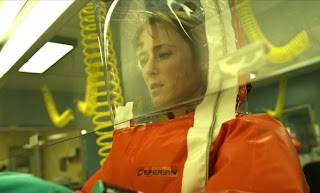“Contagion” begins with the ominous sound of a person coughing. This person is Beth Emhoff (Gwyneth Paltrow, “Iron Man 2”) and, unbeknownst to her, she is the first known person to carry a newly developed virus that can cause intense headaches, perspiration, seizures and death. By the time Beth has died in hospital as a direct result of the virus, she has already sparked its rapid spread from country to country; soon enough, the virus will consume the globe, infecting and killing millions in the process; this virus is much worse than bird flu, lemme tell you that.
This is director Steven Soderbergh’s ultra-realistic disaster drama-thriller set in the present day. Well, I say ultra-realistic, but I myself am maybe not equipped enough to say so. I’m not a medical doctor nor a professional in dealing with global epidemics, but as far as I could tell the film painted a fairly realistic picture of what would happen if a very lethal and very contagious disease began to spread throughout the world. If not, then it sure fooled me.
As is usual with the disaster genre, “Contagion” carries an ensemble cast of big star names; it has a script that balances them with ease, with no actor getting lost in the ocean of very recognisable A-listers. This is also a result of sublime acting performances, which aid in making the film feel so real and compelling as we watch the story unfold.
Laurence Fishburne (“Predators”) plays Dr. Ellis Cheever, a high-up official of the Centres for Disease Control and Prevention who is tasked with dealing with the virus’ outbreak. He assigns Dr. Erin Mears (Kate Winslet, “Revolutionary Road”) of the Epidemic Intelligence Service to keep track of who is currently infected and thus try to stop the spread.
Marion Cotillard (“Midnight in Paris”) plays Dr. Leonora Orantes, an epidemiologist who travels to Hong Kong to investigate the source of the virus. Jude Law (“Repo Men”) plays Alan Krumwiede, a conspiracy theorist and internet blogger who believes the government is doing very bad, very scandalous things for financial gain; turns out he’s a bit of a hypocrite.
Matt Damon (“The Adjustment Bureau”) plays Mitch Emhoff, husband of the late Beth. He comes home from the hospital to discover his young son has also died from the virus. It turns out Mitch is immune to the virus, but is his daughter, Jory (Anna Jacoby-Heron)? The doctors can’t tell yet. He’s determined to protect her from anyone carrying the virus, or anyone who could be carrying the virus until she can be treated with the yet-undiscovered vaccine. He’s already lost his wife and son, he’s not going to lose his daughter now too.
Damon’s character feels like more of a protagonist than any of the other characters, though he shares an equal amount of screen-time with his co-stars. Perhaps this is because he’s the most human character; all others are government officials questioning and investigating, while Mitch is just a man trying to protect his daughter. He’s a likable and noble man with whom we can fully relate; I mean, the only other main character who is not a government official is played by Jude Law, and he’s a knob.*
Still, the government folks in the film are also made to be relatable. They are shown to be flawed human beings rather than a bunch of soulless bureaucrats in suits. They are people trying to get their job done in extreme circumstances. They are trying to save the world and control a situation that seems to be uncontrollable. The world’s health and sanity is at their fingertips; the world is scared and they too are scared. As a result, their character flaws begin to seep through the surface.
There’s a lot of medical jargon in the film; I suppose this is an inevitability when many of the characters are doctors who must frequently converse about a dangerous virus that’s spreading across the globe. I think I got the gist of what they were saying most of the time, the majority of it consisting of explanations of what the virus consists of, its danger level, where it’s spreading and where it is going to spread. It’s a bit like watching “ER;” you’re often perplexed by the jargon yet still able to follow the basics. Anyway, all we need to know is this: there’s a disease, it’s a bad disease, it’s spreading everywhere and it’s killing everybody up in here.
I can imagine all of this happening in real-life in the way the film portrays it would. I can imagine quarantines being put in place, I can imagine mass panic and violence in the streets and I can imagine the government reacting the way it does in the film. Also, with the average person touching their face three to five times every waking minute (this film taught me that), I can imagine the virus spreading so quickly in such a short space of time. That’s ultimately what I loved about “Contagion:” I believed it and didn’t doubt the story; I could be fully enthralled in the narrative without frequently questioning its realism, which is more than I can say for some films.
“Contagion” works as both a drama and a disaster movie, in fact succeeding very well at both. These elements go hand-in-hand without fault; I suppose disaster always comes with a slice of drama, anyway. It’s a very compelling film that doesn’t resort to mindless thrills for entertainment value. It’s an intelligent disaster flick that’s about emotion as opposed to spectacle; we don’t have enough of those these days.
8/10
*Just kidding, I like Jude Law. Sort of.






No comments:
Post a Comment